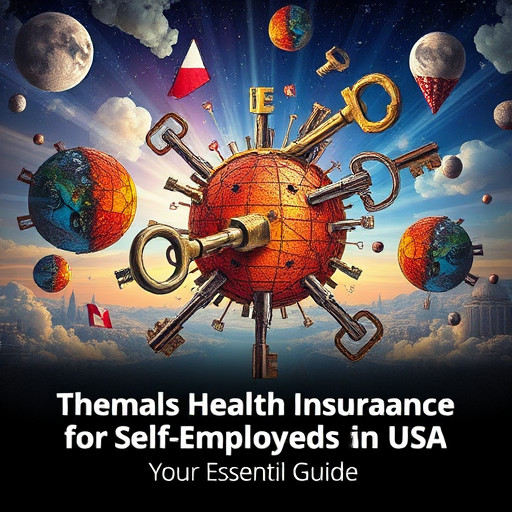Unlocking Health Insurance for Self-Employed Individuals in the USA – Your Essential Guide

Navigating Health Insurance for Self-Employed Individuals in the USA can feel daunting, especially with the complexities of the American healthcare system. As a self-employed individual, you are not only responsible for your business but also for securing health coverage that meets your unique needs. Understanding the options available to you is crucial in ensuring your health and financial well-being.
Who Needs Health Insurance for Self-Employed Individuals in the USA
The landscape of self-employment has evolved significantly in recent years. More individuals are venturing into entrepreneurship, freelancing, and gig work, which brings about both freedom and responsibility. One of the most pressing responsibilities is obtaining health insurance.
The Growing Trend of Self-Employment
Self-employment has become increasingly popular as people seek greater control over their professional lives. According to various studies, a substantial percentage of the workforce has shifted towards freelance or contract roles. This trend often arises from desires for flexibility, autonomy, and the opportunity to pursue passion projects.
As these self-employed individuals enjoy the fruits of their labor, they must grapple with the reality of health insurance. Unlike traditional employees whose health benefits are typically managed by their employers, self-employed workers must navigate the process independently. This independence can lead to challenges in identifying suitable health insurance plans that cater to their specific needs.
Understanding Your Unique Needs
https://www.profitablecpmrate.com/dexuw7mhmv?key=6503b2f78ec4209747696c3d01ba1d23
When it comes to health insurance, what works for one individual may not work for another. Self-employed individuals range from freelancers and consultants to small business owners, each with different lifestyles and health requirements. Assessing your unique needs is critical. Consider factors such as age, family status, health conditions, and financial situation before selecting a plan.
Moreover, understanding the potential risks that come with being self-employed, such as fluctuating income, is vital. Choosing the right health insurance can provide peace of mind, allowing you to focus on growing your business rather than worrying about unexpected medical expenses.
Legal Requirements and Compliance
In the United States, there are legal obligations regarding health insurance coverage. For instance, under the Affordable Care Act (ACA), individuals are required to have health insurance or face penalties. Although this requirement has been changed in some states, many still uphold the importance of having coverage to ensure access to necessary medical care.
Understanding these legal frameworks is essential for self-employed individuals. Not only do they need to comply with federal regulations, but state-specific laws may also impact health insurance choices. Consequently, staying informed about local legislation is equally important in making educated decisions regarding health insurance.
How to Find Health Insurance for Self-Employed Individuals in the USA
Finding suitable health insurance for self-employed individuals involves several steps. By conducting thorough research and evaluating all available options, you can identify the best plan for your needs.
Evaluate Different Plans
The first step in finding health insurance is exploring the various types of plans available. Self-employed individuals generally have access to:
- Individual health insurance plans
- Marketplace insurance through healthcare.gov
- Short-term health insurance
- Health Savings Accounts (HSAs)
- Professional associations or trade groups that offer group insurance
Each of these options has its pros and cons, depending on your unique circumstances. For instance, marketplace insurance can provide subsidies based on income, making it an accessible choice for many self-employed individuals. In contrast, short-term health insurance might be appealing for those seeking temporary coverage during transitional periods.
Compare Premiums and Coverage
Once you’ve identified potential plans, the next step is to compare premiums and coverage. While lower premiums may seem enticing, it’s crucial to analyze what each plan covers beyond just monthly payments. Look for essential benefits such as preventative care, hospitalization, prescription drugs, and mental health services.
Reading policy documents carefully will help you understand out-of-pocket costs, including deductibles, copayments, and coinsurance. This level of detail will allow you to make an informed decision and select the plan that fits your budget while providing adequate coverage.
Seek Expert Guidance
Navigating the world of health insurance can be overwhelming, particularly for someone who is self-employed. Seeking assistance from professionals like insurance brokers or consultants can streamline the process. These experts can provide tailored advice based on your specific needs and budget, helping you choose a plan that aligns with your goals.
Furthermore, consider reaching out to fellow self-employed individuals through networking platforms or online groups. Sharing experiences and recommendations can yield valuable insights into navigating health insurance options and uncovering lesser-known resources.
Pros and Cons of Health Insurance for Self-Employed Individuals in the USA
While acquiring health insurance offers numerous advantages, it’s equally important to be aware of the associated drawbacks. Understanding both sides of the equation will enable self-employed individuals to make sound decisions regarding their healthcare coverage.
Advantages of Health Insurance
Having health insurance provides several benefits. First and foremost, it ensures access to necessary medical care without incurring crippling debt. With the rising costs of healthcare in the United States, avoiding unexpected medical bills is essential for maintaining financial stability.
Another key advantage of health insurance is the sense of security it provides. Knowing that you have a safety net in case of emergencies can alleviate stress, allowing you to focus on your business. Moreover, many health insurance plans promote preventive care through regular check-ups and screenings, which can lead to early detection of health issues.
Additionally, self-employed individuals may be eligible for various tax deductions related to health insurance premiums. This could significantly lower taxable income, resulting in a more favorable financial situation.
Drawbacks of Health Insurance
Despite the benefits, health insurance for self-employed individuals comes with certain challenges. One major drawback is the cost associated with premium payments. Depending on the plan selected, monthly premiums can take a considerable chunk of your budget, affecting overall cash flow.
Another consideration is the complexity of health insurance policies. Navigating terms and conditions can be intricate, especially when faced with jargon that is difficult to understand. Many self-employed individuals may find themselves overwhelmed when attempting to comprehend their health coverage fully.
Lastly, pre-existing conditions can complicate matters further. Some plans may impose waiting periods for coverage related to pre-existing health issues, leaving individuals vulnerable during that timeframe. It’s essential to carefully evaluate how different plans address pre-existing conditions to ensure comprehensive coverage.
Alternatives to Health Insurance for Self-Employed Individuals in the USA
For self-employed individuals, health insurance is not the only option available. While it’s one of the primary strategies to manage health risk, various alternatives may better suit specific circumstances.
Health Care Sharing Ministries
Health care sharing ministries are organizations where members share healthcare costs. These programs operate on a faith-based model, and while they aren’t traditional insurance, they can provide a sense of community and affordability. Members pay a monthly fee, which goes toward covering the medical expenses of fellow participants.
However, it’s essential to note that these programs often come with limitations. They may not cover all types of care, including certain preventive services, making it vital to read the fine print and understand your potential risks before joining.
Medical Discount Plans
Medical discount plans are another alternative that allows individuals to save money on healthcare services. For a monthly fee, participants receive discounted rates for various medical services, including doctor visits, dental care, and prescriptions.
While these plans don’t provide traditional insurance coverage, they can help mitigate costs associated with routine care. Self-employed individuals should weigh the value of these plans against their health needs to determine if they are a suitable option.
Flexible Spending Accounts (FSAs) and Health Savings Accounts (HSAs)
Flexible Spending Accounts (FSAs) and Health Savings Accounts (HSAs) offer tax-advantaged ways for self-employed individuals to set aside money for healthcare expenses. FSAs allow participants to use pre-tax dollars for qualified medical expenses within a given year, while HSAs enable individuals to save for future medical needs with additional tax benefits.
These accounts can enhance your overall healthcare strategy, allowing you to allocate funds specifically for out-of-pocket expenses. However, it’s important to adhere to contribution limits and rules associated with each account type for optimal benefits.
Step-by-Step Guide to Obtain Health Insurance for Self-Employed Individuals in the USA
Acquiring health insurance as a self-employed individual requires careful planning. This step-by-step guide aims to simplify the process and empower you with the knowledge necessary to secure the right coverage.
Research Available Options
Start by researching the various health insurance options available to you. Visit healthcare.gov to explore plans through the ACA marketplace, or consult websites of major insurers offering individual plans. Make a list of the plans that align with your budget and preferences.
Engaging with communities and forums focused on self-employment can provide valuable insights into the experiences of others. This collaborative approach can yield ideas and recommendations that might not be apparent through traditional research methods.
Analyze Your Budget
Next, conduct a thorough assessment of your budget. Consider your monthly income, fixed expenses, and discretionary spending. Allocate a portion of your budget specifically for health insurance premiums and out-of-pocket costs.
It’s important to strike a balance between affordability and adequate coverage. Creating a budget template can help visualize your financial priorities, facilitating smarter decisions regarding health insurance.
Get Quotes and Compare Plans
Once you’ve identified potential plans, request quotes from multiple providers. Pay close attention to premiums, coverage details, deductibles, and any exclusions. Once you have a comprehensive overview, compare the plans side by side to identify the best fit.
Utilizing online comparison tools can expedite this process, giving you a quick snapshot of different plans’ features. Don’t hesitate to contact insurance representatives for clarification on aspects you may find confusing.
Enroll in a Plan
After evaluating your options, it’s time to enroll in a plan. Be aware of enrollment periods, as missing deadlines could limit your choices. If you’re enrolling through the ACA marketplace, familiarize yourself with the open enrollment period to avoid any complications.
During enrollment, ensure that all information provided is accurate, as discrepancies could affect your coverage. After submitting your application, keep copies of all documentation for reference in the future.
Tips for Managing Health Insurance as a Self-Employed Individual in the USA
Managing health insurance effectively is crucial for self-employed individuals looking to maximize their coverage while keeping finances in check. Here are some practical tips to help navigate the complexities of health insurance.
Stay Informed About Policy Changes
Health insurance policies can change frequently, both at the federal and state levels. Staying informed about any policy changes is essential for remaining compliant and maximizing coverage benefits. Subscribe to newsletters or follow relevant organizations that provide updates on health insurance regulations.
Regularly reviewing your own policy for any modifications is equally important. If your plan undergoes changes, assess whether it still meets your needs or if adjustments are necessary.
Utilize Preventive Services
Many health insurance plans offer preventive services at no additional cost. These services include screenings, immunizations, and wellness check-ups designed to catch potential health issues early on. Taking advantage of these services not only supports personal health but can also minimize long-term healthcare costs.
Make it a habit to schedule regular check-ups and stay proactive about your health. Establishing a relationship with a primary care provider can foster better communication and lead to improved health outcomes.
Keep Accurate Records
Maintaining organized records of medical expenses, receipts, and insurance correspondence is crucial for tracking healthcare costs and ensuring proper reimbursements. A well-documented record can facilitate smoother interactions with your insurance provider, especially when disputing claims or addressing billing errors.
Consider using digital tools or apps designed for expense tracking. These resources can streamline the process and make it easier to access important documents when needed.
Frequently Asked Questions
What is the best health insurance option for self-employed individuals?
The best option varies based on individual circumstances. Marketplace insurance plans often provide robust coverage and potential subsidies, making them a popular choice. Individual plans, group options through professional associations, and health care sharing ministries are worth exploring as well.
Can self-employed individuals deduct health insurance premiums?
Yes, self-employed individuals can typically deduct health insurance premiums from their taxable income, reducing overall tax liability. Consult a tax advisor to maximize deductions and understand eligibility criteria.
Do I need to prove income for health insurance applications?
Yes, when applying for marketplace insurance, you must provide proof of income to determine eligibility for subsidies and coverage options. Documentation such as tax returns or pay stubs is commonly required.
What happens if I miss open enrollment for health insurance?
If you miss open enrollment, you may have limited options to obtain health insurance. Special Enrollment Periods (SEPs) apply in certain situations, such as marriage or loss of prior coverage. Otherwise, you may have to wait until the next open enrollment period.
Are health insurance costs tax-deductible for self-employed individuals?
Yes, health insurance costs can be tax-deductible for self-employed individuals. To maximize tax benefits, keep thorough records of all expenses related to health insurance.
Conclusion
Navigating health insurance for self-employed individuals in the USA may appear complex, but with the right approach, it can be manageable. By understanding the options available, weighing the pros and cons, and following a strategic step-by-step process, you can secure health coverage that meets your unique needs.
Staying informed, leveraging resources, and actively managing your health insurance will ultimately empower you to thrive as a self-employed individual. Embrace the journey of self-employment and prioritize your health along the way—it is an investment in your future!



Leave a Comment